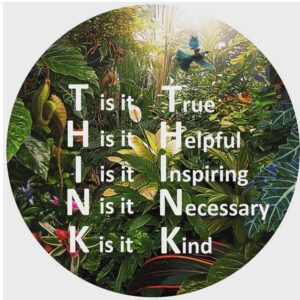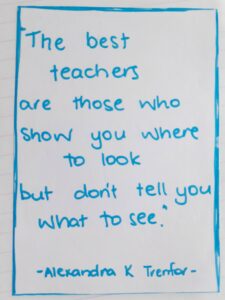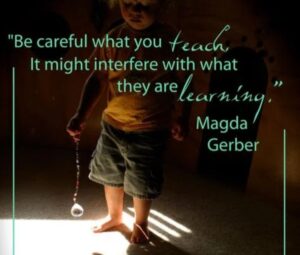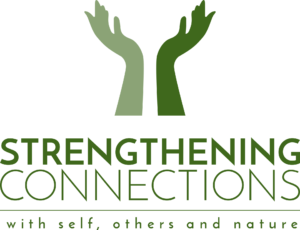Intentional Teaching:
To be always thinking about what we are doing and how it will foster the childs development, to produce lasting learning.
-Epstein
As a passionate Early Childhood educator of some 18+ years, I have learned the value and benefit of talking/’teaching’ less and listening more. In Early Childhood Education, it is more important we encourage children to have a voice, to speak up, to share, to believe in themselves. To support them in developing a positive sense of self and worth.
During my studies and early years in practice, I was encouraged to talk talk talk…. comment on what learning is happening to validate my position as a ‘teacher’. For example sitting alongside a child who is working with blocks and commenting “You are moving the blue block. The blue block is balancing on the top. Now you are adding the yellow block. Your tower is getting tall. When you added the red block it wobbled.”
Or when painting… “you are making circles with the green paint”.
Over the years, I have learned that commenting on childrens play and learning (a.k.a. unneccessary interruption) does not help to build a relationship or foster trust. Such connection is developed through presence, listening and responding when invited in to their play.
“Adult chat interrupts play and inhibits potential learning that could occur”.
– Nickie Mackwood
Imagine you (as an adult) are baking a cake or doing something you really enjoy, and a friend stands next to you saying things like “you are adding the flour, now you are adding one cup of milk. You are mixing the cake to combine the ingredients”
How would you respond?
I would say probably something like “actually, I know what Im doing, and that wasn’t flour,”.
However, if my friend said to me “you are working really hard in the kitchen” (or ‘with the blocks’), I would smile, possibly say thank you and get back to my work.
We need to think before we speak….
“Interrupted play is interrupted learning.”
-Nickie Mackwood
Children need and deserve for adults to give them the space to work through their own learning, and to value their voice when they choose to share.
Usually, the less we say, the better. That way, when we do talk, children are more likely to listen than if we literally talk hot air all day long.
There are a number of quotes that capture the essence of what I am trying to share;
“Hold your tongue
Sit on your hands
And Just observe…
SHHHHHH”
-Heart School“What we dont say is just as important as what we do say.”
-Heart School“The best teachers have bite marks on their tongue.”
– Alfie Kohn“The greatest sign of success for a teacher is to be able to say: “The children are playing as if I dont exist”.
– Maria Montessori
A story for you…
A 3 year old boy, looked up at the hills and pointed …
“Look Nickie, there’s smoke up in the hills”.
He continued with great excitement in his voice …
“they caught a pig, the dogs have caught a pig. They are singeing it on the fire and cooking it for dinner”.
He seemed so sure about this.
This was the moment when the child invited me in to his ‘play’.
I could have ‘corrected them, by telling them that in fact there was no smoke, it was fog but why? What for? Because I know better?
Because my truth is more important than his? Was this an appropriate time to go into a full lesson about Fog?
“Children do not need us to shape them.
They need us to respond to who they are.”
-Naomi Aldort
I reflected and thought of all the benefits to biting my tongue.
In this moment, the child is imagining, communicating, developing self worth through sharing, fostering connections with me and the land, he is thinking as he remembers back through his experience and he is happy.
I responded with a smile of interest and presence,
“that sounds tasty”.
When I suggested it sounded tasty, he briefly agreed before going on to share more
“yeah, I go pig hunting with my dad. He has 3 dogs but one of them is naughty and gets lost all the time.”
It was obvious with this response, it wasnt the taste of the dinner that mattered.
* Imagine if I over shared here or went on about it… that would have been me guiding/steering the conversation, (my truths are not more important than theirs. It is their voice we want to hear). I would have not gained any more information about them, their home life or their experiences. I would have lost their interest, their confidence and their connection. They most likely would have stopped sharing, imagining and feeling the joy and connection.
Bubble (of play and learning) POPPED!!
In this moment, I realised, he was the expert here. My role was to listen and encourage his sharing. He was teaching me. And connecting with me.
“Unless the teacher is a discoverer, an inventor or a creator of new methods, he is a mere assistant and no master”
-Rudolf Steiner
Can you imagine the feeling of confidence and pride he felt as he shared his knowledge? Now imagine if I had corrected him and taught him all about FOG!?!
I believe he would have felt unheard, like his knowledge and experience wasn’t important or valid. I believe he wouldnt have been interested in hearing about fog.
“No interest = no learning”.
-Nickie Mackwood
This child is not going to get to adulthood and not understand Fog if I dont teach him now at age 3.






